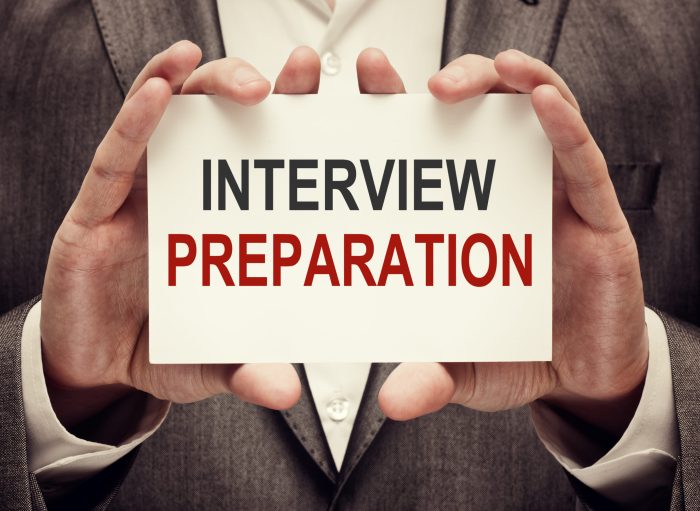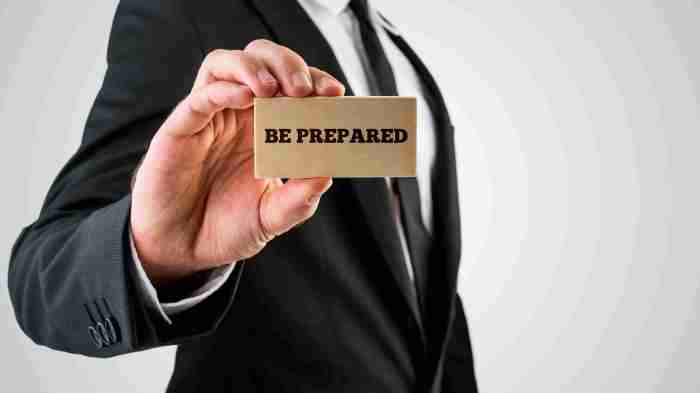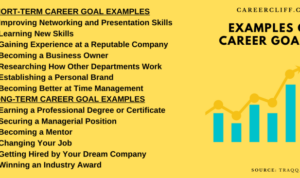Job Interview Preparation kicks off with a bang, giving you the lowdown on how to nail that interview like a boss. Whether you’re new to the game or a seasoned pro, these tips will have you feeling confident and ready to impress.
Get ready to learn about researching the company, acing common interview questions, dressing for success, and mastering body language and communication. Let’s dive in!
Researching the Company
When prepping for a job interview, it’s crucial to do your homework on the company you’re interviewing with. This research not only shows your interest and preparedness but also helps you tailor your answers to align with the company’s values and goals.
Importance of Researching the Company
- Gain a better understanding of the company culture and values.
- Show that you are genuinely interested in the position and company.
- Helps you prepare insightful questions to ask during the interview.
- Allows you to tailor your responses to showcase how you can contribute to the company’s success.
Strategies for Effective Company Research
- Visit the company website to learn about their mission, products/services, and recent news.
- Check out the company’s social media profiles for updates and insights into their culture.
- Read reviews from current and former employees on platforms like Glassdoor to get an inside look.
- Research the company’s competitors to understand the industry landscape.
Tailoring Answers During the Interview
- Use the information gathered to align your experiences with what the company is looking for.
- Reference specific projects or initiatives the company is involved in to show your knowledge and interest.
- Show how your skills and experiences can benefit the company based on your research.
- Highlight how you can contribute to the company’s goals and objectives in a meaningful way.
Common Interview Questions
When preparing for a job interview, it’s crucial to be ready to answer common questions that are frequently asked by interviewers. These questions are designed to assess your skills, experience, and fit for the role. Structuring your responses effectively and practicing them beforehand can help you feel more confident and articulate during the interview.
Behavioral Questions
Behavioral questions are commonly asked in interviews to understand how you have handled specific situations in the past. When responding to behavioral questions, use the STAR method:
– Situation: Describe the context of the situation.
– Task: Explain the specific task you were responsible for.
– Action: Detail the actions you took to address the situation.
– Result: Share the outcomes of your actions and what you learned from the experience.
Strengths and Weaknesses
When asked about your strengths, focus on relevant skills and qualities that align with the job requirements. Provide examples to support your strengths. For weaknesses, be honest but also demonstrate self-awareness and show how you are working to improve in those areas.
Why Do You Want This Job?
Employers are interested in knowing why you are interested in the position and the company. Tailor your response by highlighting what excites you about the role, how your skills align with the job responsibilities, and why you are drawn to the company’s values and culture.
Tell Me About Yourself
This question is often used as an icebreaker. Provide a brief overview of your professional background, focusing on relevant experience, skills, and achievements. Keep it concise and tailored to the job you are interviewing for.
Where Do You See Yourself in 5 Years?
When answering this question, demonstrate your ambition and long-term career goals. Show that you have a clear vision for your professional development and how you see yourself growing within the company.
Salary Expectations
Research the average salary range for the position and industry to provide a realistic salary expectation. Consider factors like your experience, skills, and the company’s budget when discussing salary.
Dressing for Success

Dressing appropriately for a job interview is crucial as it not only reflects your professionalism but also helps you make a positive first impression. Your outfit should align with the company culture and the position you are applying for.
Appropriate Attire for Different Types of Job Interviews
For a corporate job interview, opt for a tailored suit in neutral colors like black, navy, or grey. Pair it with a crisp shirt/blouse and closed-toe shoes. Avoid flashy accessories and make sure your grooming is on point.
Choosing the Right Outfit Based on Company Culture
If you are interviewing at a tech startup or a creative agency, you can go for a more casual look. A smart casual outfit with well-fitted jeans, a button-down shirt, and stylish shoes can be appropriate. Research the company culture beforehand to gauge the dress code.
Impact of Dressing Professionally on First Impressions
Dressing professionally shows that you are serious about the job and respect the opportunity. It gives the impression that you pay attention to detail and are capable of representing the company well. Remember, you never get a second chance to make a first impression!
Body Language and Communication: Job Interview Preparation

Body language and communication play a crucial role in making a positive impression during a job interview. Your nonverbal cues and how you articulate your responses can greatly impact how you are perceived by the interviewer.
Importance of Body Language
- Eye contact: Maintaining good eye contact shows confidence and interest in the conversation.
- Posture: Sitting up straight demonstrates attentiveness and professionalism.
- Smiling: A genuine smile can help create a positive and friendly atmosphere.
- Hand gestures: Using appropriate hand gestures can enhance your communication and make you appear more engaging.
- Mirror the interviewer: Subtly mirroring the body language of the interviewer can build rapport and establish a connection.
Verbal Communication Skills, Job Interview Preparation
- Clear and concise: Practice articulating your thoughts clearly and concisely to convey your message effectively.
- Active listening: Show that you are actively listening by nodding, asking relevant questions, and responding thoughtfully.
- Tone of voice: Pay attention to your tone of voice, as it can convey enthusiasm, confidence, or interest in the topic being discussed.
- Avoid filler words: Minimize the use of filler words like “um,” “uh,” and “like,” as they can detract from your overall communication skills.
- Ask questions: Asking thoughtful questions demonstrates your interest in the role and company, while also showcasing your communication skills.
